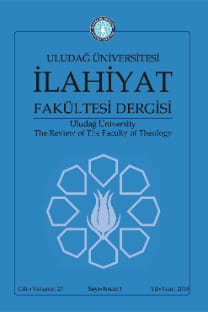“Siyasal İslâm”ın Öncüleri: El-Benna ve el-Mevdûdî’nin İdeolojileri Üzerine Bir Analiz
Yirminci yüzyılın ilk dönemi, İslam Dünyası’nda bazı etkili dini-siyasi sosyal hareketlerin ortaya çıktığı bir dönemdir. Öyle anlaşılıyor ki bu hareketlerin en güçlüleri Mısır merkezli İhvan-i Müslimîn ve Pakistan merkezli Cemaat-i İslami’dir. Bu hareketlerin öteki benzer hareketlere oranla daha etkili olduğu hususunda neredeyse bir konsensüs olduğu söylenebilir. Bu makale, söz konusu sosyal siyasal ve dini hareketlerin, takip eden yıllarda ortaya çıkan benzer hareketleri nasıl etkilediğini belirleyebilmek amacıyla, kurucularının ideolojilerini araştırmayı hedeflemektedir
Anahtar Kelimeler:
Siyasal İslâm, Hasan el-Bennâ, Ebu’l-A’la Mevdûdî, İhvan-i Müslimîn, Cemaat-i İslami
Forerunners of “Political Islam”: An inquiry into the Ideologies of Al-Banna and Al-Mawdudi
AbstractThe early twentieth century witnessed the emergence of several Islamic movements in the Muslim world. Arguably, two of these movements have been more influential than certain others, namely, Ikhwan al-Muslimun (Muslim Brotherhood) in Egypt and Jamaat-e-Islami (Muslim Community) in Pakistan. This paper aims to anlayse the ideologies of their founders with a view to determining the influence they continue to have upon the similar religio-plitical movements today in the Muslim World and elsewhere. Key Words: Political Islam, Hasan al-Banna, Abu’l-A’la Mawdudi, Ikhwan al-Muslimun, Jamaat-e- Islami “Siyasal İslâm”ın Öncüleri: El-Benna ve el-Mevdûdî’nin İdeolojileri Üzerine Bir AnalizÖz Yirminci yüzyılın ilk dönemi, İslam Dünyası’nda bazı etkili dini-siyasi sosyal hareketlerin ortaya çıktığı bir dönemdir. Öyle anlaşılıyor ki bu hareketlerin en güçlüleri Mısır merkezli İhvan-i Müslimîn ve Pakistan merkezli Cemaat-i İslami’dir. Bu hareketlerin öteki benzer hareketlere oranla daha etkili olduğu hususunda neredeyse bir konsensüs olduğu söylenebilir. Bu makale, söz konusu sosyal siyasal ve dini hareketlerin, takip eden yıllarda ortaya çıkan benzer hareketleri nasıl etkilediğini belirleyebilmek amacıyla, kurucularının ideolojilerini araştırmayı hedeflemektedir.Anahtar Kelimeler: Siyasal İslâm, Hasan el-Bennâ, Ebu’l-A’la Mevdûdî, İhvan-i Müslimîn, Cemaat-i İslami
Keywords:
-,
___
- Adams, Charles J., “The Ideology of Mawlana Mawdudi”, South Asian Politics and Religion (ed. Donalt E. Smith), Princeton: Princeton University Press 1966.
- ___, “Mawdudi and the Islamic State”, Voices of Resurgent Islam (ed. John L. Esposito), New York: Oxford University Press 1983.
- Ahad, Rafiuddin, “Redefining Muslim Identitiy in South Asia: The Transfor-mation of the Jamaat-e-Islami”, Accounting for Fundamentalism: The Dynamic Character of the Movements, Chicago: University of Chicago Press 1994.
- Ahuda, Gehad, "The 'Normalization' of the Islamic Movements in Egypt From 1970s to the Early 1990s", Accounting for Fundamentalism: The Dynamic Char-acter of Movements, Chicago: University of Chicago Press 1994, pp. 374-412.
- Al-Abidin, A.Z, “The Political Thought of Hasan al-Banna”, Hamadard Islami-cus, September, 1988.
- Al-Banna, Hasan, “Between Yesterday and Today”,Five Tracts of Hasan al-Banna (trans. Charles Wendell), Berkeley: University of California Press 1975.
- ___, “Our Mission”, Five Tracts of Hasan al-Banna (trans. Charles Wendell), Berkeley: University of California Press 1975.
- ___, “To What Do We Summon to Mankind?”, Five Tracts of Hasan al-Banna (trans. Charles Wendell), Berkeley: University of California Press 1975.
- ___, “Toward the Light”, Five Tracts of Hasan al-Banna (trans. Charles Wendell) Berkeley: University of California Press 1975.
- Armajani, Yahya, Middle East: Past and Present, NJ: Princeton Hall Inc. 1970.
- Binder, Leonard, Religion and Politics in Pakistan, Berkeley: University of Cali-fornia Press 1963.
- Commins, David, “Hasan al-Banna (1906-1949)”, Pioneers of Islamic Revival (ed. Ali Rahmena), London: Zed Books 1994.
- Denny, Fredrick M, Islam and Muslim Community, New York: Harper & Row 1987.
- El-Ghobashy, Mona, “The Metamorphosis of the Egyptian Muslim Brothers”, International Journal of Middle East Studies, Volume 37 (Aug.2005/3), pp. 373-395.
- Esposito, J.L., The Islamic Threat: Myth or Reality?, New York: Oxford University Press 1992.
- Gragg, Kenneth, Islamic Surveys: Counsels in Contemporary Islam, Edinburgh: Edinburgh University 1965.
- Hussain, Asaf, Islamic Movements in Egypt, Pakistan and Iran, London: Mansell Publishing Limited 1983.
- Mawdudi, Abu’l Ala, Islamic Law and Constitution (ed. Kurshid Ahmad), Kara-chi: Jamaat-e-Islami Publications 1995.
- ___, Economic System of Islam (ed. Kurshid Ahmad-trans. Rifat Hussain) La-hore: Islamic Publications 1984.
- ___, Human Rights in Islam (trans. Kurshid Ahmad and Said Khan), Leichester: The islamic Foundaiton 1972.
- Momin, Abdur-Rahman, “On Islamic Fundamentalism”, Hamdard Islamicus, October, 1987.
- Mura, Andrea, “A Genealogical Inquiry into Early Islamism: The Discourse of Hasan al-Banna”, Journal of Political Ideologies, 17 (2012/1), pp. 61-85.
- ___, “The Inclusive Dynamics of Islamic Universalism: From the Vantage Point of Sayyid Qutb’s Critical Philosophy”, Comparative Philosophy, 5 (2014/1), pp. 29-54.
- Nasr, S. Hussain. “Present Tendencies, Future Trends,” in Islam: The Religious and Political Life of a World Community. Ed., Marjorie Kelly. New York: Prae-ger, 1984.
- Pelikan, Jaroslav, “Fundamentalism and/or Orthodoxy? Toward an Under-standing of the Fundamentalist Phenomenon”, The Fundamentalist Phenom-enon. (ed. Norman J. Cohen), Michigan: Grand Rapids 1990.
- Rahman, Fazlur, Islam and Modernity: Transformation of an Intellectual Tradition, Chicago: University of Chicago Press 1982.
- Sayyid, S. Boby, A Fundamental Fear: Eurocentrism and the Emergence of Islamism, London: Zed Books 2004.
- Yinger, J. Milton, The Scientific Study of Religion, London: The Macmillian Company 1970.
- Zaid, Mohammed, The Muslim Brotherhood and Egypt’s Succession Crisis: The Politics of Liberation and Reform in the Middle East, New York: I.B. Tauris Pub-lishers 2010.
- ISSN: 1301-3394
- Yayın Aralığı: Yılda 2 Sayı
- Yayıncı: -
Sayıdaki Diğer Makaleler
Şeyhülislâm Esîrî Mehmed Efendi ve Vakıfları
Tasavvufun Bir İlim Olarak İnşâ Süreci: Şer’î ve Metafizik Bir İlim Olarak Tasavvuf
Kuzey Afrika İbâzî Akidesi: Cenâvünî Örneği
Tanah’a Göre Kudüs’ün Kutsallaşma Süreci
Eğitimci Yönüyle Ahmed Cevdet Paşa
Niğde İli Bor İlçesine Bağlı Çukurkuyu Kasabası’na Ait Halk Dilinde Yer Alan Arapça Kelimeler
“Siyasal İslâm”ın Öncüleri: El-Benna ve el-Mevdûdî’nin İdeolojileri Üzerine Bir Analiz
